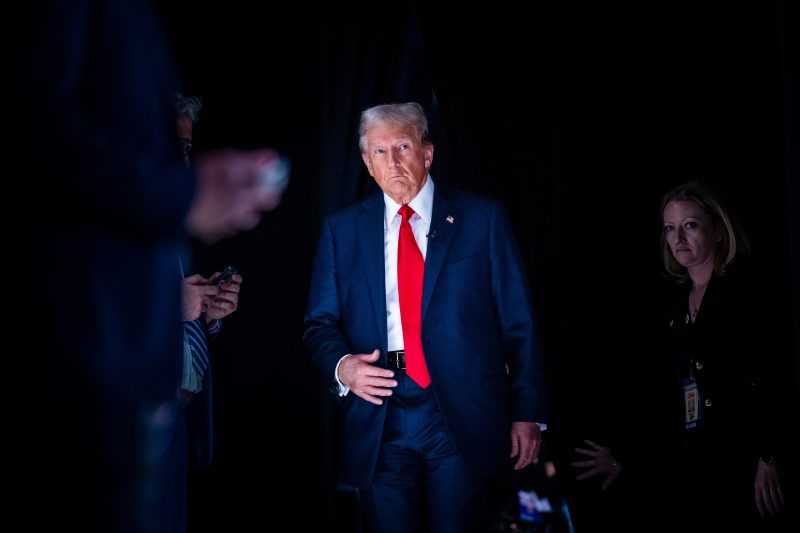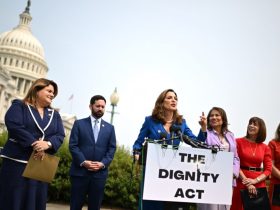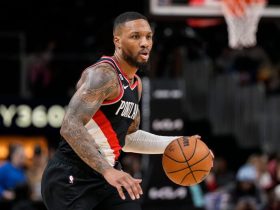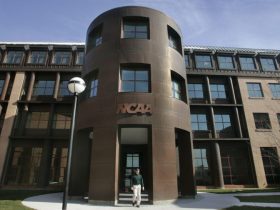Former president Donald Trump’s campaign is aiming to announce his running mate by July 15, the first day of the Republican National Convention, according to people familiar with the situation, and internal discussions have largely centered on two finalists as he nears a decision.
Trump has not communicated his choice, the people familiar with the situation said, but discussions inside the campaign have narrowed in on Sens. J.D. Vance (R-Ohio) and Marco Rubio (R-Fla.). North Dakota Gov. Doug Burgum is also in the mix, and Trump, who has a habit of changing his mind, was privately discussing other names as recently as the last week, according to the people with knowledge of the situation. Like others interviewed for this story, the people spoke on the condition of anonymity to describe private talks.
Trump has two rallies scheduled this upcoming week: One on Tuesday in Miami, Florida and the other on Saturday in Butler, Pennsylvania. Trump has publicly said he would name his vice-presidential pick at the convention. The nomination is expected to take place July 15 under convention protocol, according to two of the people with knowledge of the situation. The vice-presidential pick is slated to speak on Wednesday, July 17.
The former president’s running mate choice is one of the most closely watched decisions of his campaign. Trump said in June that he had decided on his vice-presidential pick but hadn’t told the person yet.
“The vice-presidential pick is a very personal thing for the president,” said Sen. Lindsey Graham (R-S.C.), a Trump ally. “The vice president’s job is to basically support the president’s policies and be an advocate for what he wants.”
The Trump campaign previously requested vetting documents from at least eight potential candidates. In addition to Vance, Rubio and Burgum, the campaign requested documents from Sens. Tim Scott (R-S.C.) and Tom Cotton (R-Ark.); Reps. Elise Stefanik (R-N.Y.) and Byron Donalds (R-Fla.) and former secretary of Housing and Urban Development Ben Carson.
Trump’s decision carries major potential implications for governance and politics. Trump is 78 and would be term limited if he wins in November. He has been a dominant figure in the Republican Party for eight years with no clear successor. It’s also unclear if a running mate would become that person: Trump broke with his first-term vice president, Mike Pence, over Pence’s refusal to try to overturn the 2020 election results.
“Doug Burgum is the choice if you’re worried about governing,” said Brad Todd, a Republican strategist. “J.D. Vance is the candidate if you think you’re going to win no matter what and you’re trying to shape the party going forward. Marco Rubio is the candidate you pick if you’re worried about winning the election.”
The decision comes at a moment of flux in the presidential race, when President Biden’s future has been cast into uncertainty after a widely panned debate performance in which he appeared to lose his train of thought several times. Biden has vowed to stay in the race but a growing number of Democrats have called on him to step aside and some in the party have embraced Vice President Harris as a potential alternative.
“As President Trump has said himself, the top criteria in selecting a Vice President is a strong leader who could make a great President,” said Trump campaign senior adviser Brian Hughes in a statement. He added that only Trump knows who the pick will be and when it will be made.
Several Trump allies have described Vance as a leading candidate, though Trump advisers have cautioned that the situation is more fluid. The 39-year-old Ohio Republican’s allies argue that he would bring communication skills to the presidential ticket, noting that he is comfortable doing interviews both in conservative and mainstream media. They say he is closely ideologically aligned with Trump and point to his connection to tech world donors such as Peter Thiel and David Sacks, the latter of whom Vance worked with to organize a San Francisco fundraiser for Trump in June.
Trump has publicly praised Vance and promoted the senator’s television appearances defending him. Vance has “done very well” on CNN and the Sunday morning news shows, one person familiar with the vice-presidential selection process said. He also has several supporters in the former president’s orbit including Donald Trump Jr. and Tucker Carlson, who has spoken to Trump about picking Vance, according to the person familiar with the process.
His allies argue that he can connect with working class voters because of his own background growing up in a working class family, as well as donors given his celebrity fame from writing the memoir “Hillbilly Elegy” and his Yale Law School credentials. And they note he’s a veteran, having served in the Marines before going to college. (He would be the first Marine veteran to serve as vice president.)
“J.D. Vance is the future of the Republican Party,” said Rep. Jim Banks (R-Ind.) “There’s a great case to make him the running mate because whoever Donald Trump taps to be his vice president is immediately in contention to be president four years later which makes this decision a lot different than the decision he made in 2016.”
Yet some of Vance’s GOP critics have noted his previous criticism of Trump — he once wrote the former president was “unfit” for the White House — and say his experience in government is more limited than Rubio’s or Burgum’s, given that Vance was first elected to the Senate in 2022.
They’ve also noted that while Vance won his race by six points against then-Rep. Tim Ryan (D-Ohio), he ran behind Gov. Mike DeWine and faced criticism during his run that he did not campaign aggressively enough in the general election, though some Republicans attributed his relative difficulties to his inexperience and bruising primary. Some have also questioned what additional voters Vance would bring in beyond Trump’s base. Since formally entering politics, Vance has displayed strong loyalty to Trump, whose endorsement played a key role in his Ohio Senate primary.
Rubio’s allies argue that the Cuban American senator could help Trump make inroads with non-White voters; is telegenic; has valuable foreign policy experience; and is popular with some Republican donors. Trump sees Rubio as a good messenger for his agenda, according to people familiar with the president’s thinking.
While Trump and Rubio clashed sharply during the 2016 GOP primary, with Trump nicknaming him “Little Marco” and Rubio calling the former president a “con man,” the two worked closely together while Trump was president, especially on U.S. foreign policy toward Latin American countries.
One notable obstacle for Rubio is that he and Trump are Florida residents. Under the 12th Amendment to the Constitution, a Florida elector can’t vote for the ticket if Trump and his running mate are both residents of the same state.
Burgum has developed a close relationship with Trump since the GOP primary where he was largely a non-factor. Like Vance, Burgum traveled to New York during the former president’s hush money trial, in which Trump was convicted on charges of falsifying business records related to a payment to an adult-film actress. Burgum is also independently wealthy.
As governor, Burgum signed one of the most restrictive abortion bans in the country, which Democrats plan to highlight if Trump picks him.
Democrats are already attacking Trump’s potential vice-presidential candidates more broadly and seeking to tie them closely to the top of the ticket, with the Democratic National Committee sending out regular emailed press releases about the Trump “MAGA Veepstakes.”
Last month, Trump was asked in Pennsylvania if he had picked a vice-presidential candidate.
“In my mind, yeah,” Trump replied, according to NBC News. He said he plans to announce his choice “right around the convention.”
“Maybe a little before, but could be at the convention,” Trump said. “We’ll have some great people.”








